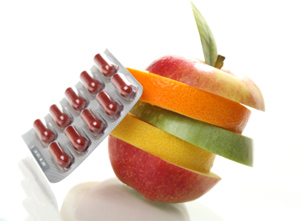Pregnancy | Your Wellbeing
Vitamin and Mineral Supplementation During Pregnancy
Taking prenatal vitamins before, during and after pregnancy is important for both you and your baby. Your body’s need for certain vitamins and minerals increases when you are pregnant, as your baby is using your existing supply to grow and develop. Although you can get a prenatal vitamin especially formulated for pregnant women, containing most of the essential supplements you’ll need, taking folic acid, iron and calcium separately is sometimes necessary. A healthy diet is of course always the best way of getting the nutrition your body needs. At times, however, you are not able to get what you need through food – especially if you are suffering from morning sickness. Let’s look at why vitamin and mineral supplementation during pregnancy is so important.
It’s best to start three to six months before conception, as the baby’s neural tube develops during the first month of pregnancy – perhaps before you even know that you’re pregnant.
Folic Acid
Helping prevent the risk of birth defects in the brain and spinal cord, folic acid is arguably the most important supplement for pregnant women. It’s advisable to start with 400 micrograms a couple of months before trying to conceive, and then increase your daily dose to 600 micrograms once you’re pregnant. Most prenatal vitamins contain 600-1000 micrograms of folic acid, so you might not have to take it separately. As for increasing your folic acid intake through your diet; eat a lot of green leafy vegetables, nuts, beans, citrus fruits, beets, broccoli, cauliflower, fortified cereals, peas and pasta.
Iron
Found in food such as beef, pork, dried beans, spinach, dried fruits, wheat germ, oatmeal, parsley and eggs, iron is another important supplement to take during pregnancy. Helping both mother and baby’s blood carry oxygen, iron will also help prevent anemia during pregnancy. The daily recommendation of iron is 27-30 milligrams, and most prenatal vitamins contain this amount. For anemia, however, you should take 60-120 milligrams daily.
Calcium
Calcium stored in the human body can mainly be found in teeth and bones, but also circulates in the blood to contract muscles and regulate the heart’s contractions. When a pregnant woman doesn’t get enough calcium from her diet, the body takes the calcium from her bones to give it to her growing baby. The daily recommendation of calcium is 1000 milligrams, and it can be found in food such as yogurt, milk, cheddar cheese and canned fish with bones. Most prenatal vitamins contain your daily dose of calcium.
Omega 3 Fatty Acids
The benefits of taking omega-3 DHA before, during, and after pregnancy are great, but the problem is that it takes a very highly concentrated form of omega-3 DHA to achieve these benefits. Omega-3 DHA intakes should average 200-300 mg per day, so there is no space in a prenatal vitamin for this dose – which is why it’s recommended to take omega-3 DHA separately. Found mainly in oily cold water fish such as salmon, mackerel, sardines and herring, omega-3 DHA supports your baby’s brain and eye development.
Multivitamin
As discussed earlier, you can get a multivitamin that is especially formulated for pregnant women; a prenatal vitamin containing the recommended daily doses of iron, folic acid and calcium – as well as small amounts of vitamin A, B12, C, D, E and zinc. Let your gynaecologist help you choose the right prenatal vitamin for you, and find out from him whether you need to take additional supplements for your individual needs. Also remember that there is no protein in prenatal vitamins, so you should try to eat protein-rich food such as lean meat, chicken and beans in order to help your baby grow and develop well.
After you have given birth you are more than likely going to be breastfeeding for a while, which means that your baby is still getting nutrients from you. This is why it’s recommended that you keep taking your prenatal vitamins for a good few months after your little one has entered the world – just to be on the safe side.
When it comes to supplements to avoid when you are pregnant, it’s a know fact that large doses can be risky. For instance, taking too much vitamin A during pregnancy can cause birth defects. So remember to limit your daily intake of vitamin A to 5000 IUs (international units) per day. But as long as you stick to taking your one prenatal vitamin and omega-3 DHA every day, and try your best to follow a healthy and balanced diet, you shouldn’t need to worry about anything else. You might however experience side-effects of prenatal vitamins, such as nausea. In this case, speak to your gynae about changing it or make sure you take your daily dose with a snack before you go to bed, rather than early in the morning without any food to go with it.



I’m two months and its my first baby. I’m just clueless about pregnancy. This is helpful.